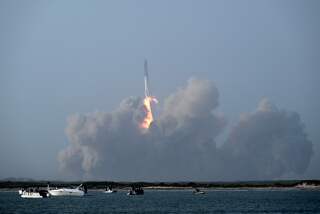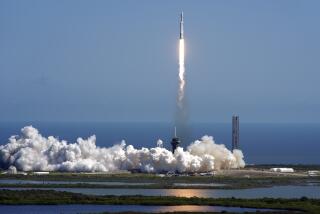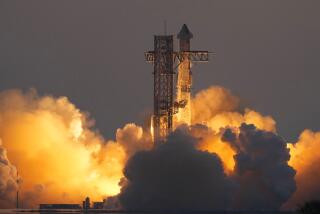SpaceX launches Falcon 9 rocket carrying 10 communications satellites

Yesterday’s SpaceX launch was successful. (June 26, 2017)
A SpaceX Falcon 9 rocket lifted off successfully Sunday afternoon from Vandenberg Air Force Base’s Western Range, carrying a payload of 10 commercial communications satellites in an important test of the company’s ability to increase launch rates.
The first stage of the Falcon 9 landed without incident on Space X’s West Coast drone ship in conditions described as “windy and marginal,” the Hawthorne company said.
SpaceX was working with an especially tight launch window, Chief Executive Elon Musk tweeted shortly before the rocket liftoff. “Launch at 1:25 delivering 10 satellites for Iridium. Droneship repositioned due to extreme weather. Will be tight,” he said.
By 2:37 p.m. Pacific time, the company reported that all 10 satellites had been successfully deployed, at a release rate of one every 100 seconds.
The Sunday launch also represented SpaceX’s fastest turnaround so far from a previous launch.
On Friday, the company launched a Bulgarian communications satellite from Kennedy Space Center using a reused first-stage that had launched the first batch of Iridium satellites earlier this year. That booster then landed on a floating droneship in the Atlantic Ocean.
Friday’s launch was the second time SpaceX has launched and landed a reused first-stage.
The satellites that launched Sunday will be part of a so-called constellation operated by Iridium Communications Inc. The satellite operator launched the first 10 satellites of this new constellation in January aboard a Falcon 9 rocket in SpaceX’s first mission after a September launch pad explosion grounded the space company for the last few months of 2016.
The network of satellites, known as Iridium Next, is intended to provide mobile communications capabilities on land, at sea and in the air. The McLean, Va., company has a contract with SpaceX for six more launches over the next 12 months to complete the constellation.
Though Iridium’s contract with SpaceX currently specifies that new first-stages will be used to launch the satellites, company Chief Executive Matt Desch said earlier this week he would be “open” to using a previously flown booster in the future. However, he said, he would want to see whether using a reused first-stage would speed up launch dates.
Twitter: @smasunaga
UPDATES:
2:40 p.m. This article was updated with additional details about the satellite deployment.
This article was originally published at 2:35 p.m.
More to Read
Inside the business of entertainment
The Wide Shot brings you news, analysis and insights on everything from streaming wars to production — and what it all means for the future.
You may occasionally receive promotional content from the Los Angeles Times.












